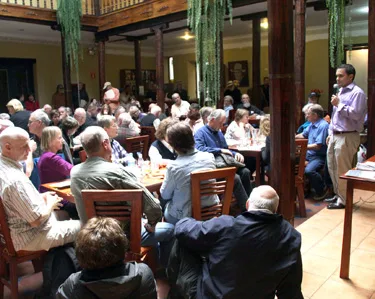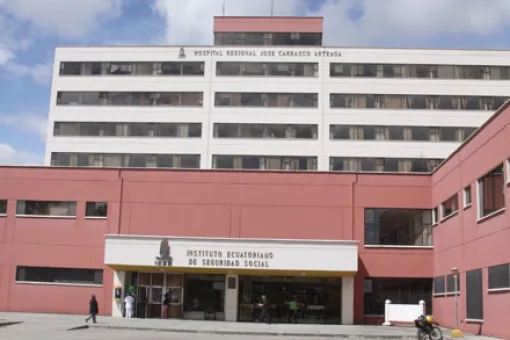An expat’s take on recent policy changes at IESS and the new immigration law
By Lee Shrader
A little background. My wife and I studied Spanish in the U.S. Our teacher took groups to Costa Rica, Colombia, Guatemala and Ecuador. We explored Panama on our own. For several years, we came to Ecuador for  two-week homestays. We decided to “experiment” with living on our own in Cuenca and came to stay for two months, then for three months, and then to get our professional visas to possibly settle here.
two-week homestays. We decided to “experiment” with living on our own in Cuenca and came to stay for two months, then for three months, and then to get our professional visas to possibly settle here.
We had explored a number of places, but we fell in love with Cuenca. Panama would possibly have been more cost effective, but we love the mountains. We love the size and amenities of the city. But mostly, we love the friendliness of the people. We were “adopted” by Amauta Fundación, our Spanish school of choice. My wife’s excellent Spanish and my continuing attempts to learn it have helped, but mostly it is the friendliness and helpfulness of the Ecuadorians that we love.
I have had two operations in Monte Sinai and have experienced wonderful care. I have used private and IESS (Social Security) doctors and experienced expert consultation at very reasonable or no cost. We love that fresh vegetables are readily available at much lower cost than in the U.S. We love our apartment, close to Parque Central (Calderon), and our landlady who has become a close friend.

Expats listen to discussion about visas.
We are not always happy about the cost of imported goods — especially electronics, cameras, etc. — but that’s another story.
But we, like I think many others, appreciate the “family” atmosphere and values of our newly adopted home. We like that, in many ways, it feels like the best of the U.S. in the 50’s and 60’s, before everything was big box, locked doors, and impersonal service. Of course, it’s not perfect, but there is an attractiveness about the openness and helpfulness of the people. I could relate many stories of being offered help by complete strangers in a wide variety of situations and locations in Cuenca.
Largely thanks to my wife’s Spanish, we had few problems navigating the IESS system and the SRI system to get enrolled and the Registro Civil system to obtain our cedulas. We were fortunate that immigration was still in Cuenca when we went through the process, but we did have to travel to Azogues to get our professional credentials registered. Because of difficulties with my fingerprints the immigration system was a bit more difficult to navigate and we were thankful for the assistance of Visa Angels. In all of our experiences with the various agencies we were met by helpful and friendly people.

Cuenca’s José Carrasco Regional IESS hospital.
As to recent developments with IESS and immigration, I do not condone rudeness to civil servants for any reason. They generally are following orders given by others and, in my experience in Ecuador, have tried to be helpful. However, I do believe that I understand one source of frustration — the difficulty of understanding what one actually needs to do to comply with government requirements.
The new immigration law was passed last year but what it really means for foreign residents seems subject to a wide variety of interpretations, which vary from person to person and day to day. One only has to read on social media the varying experiences of those applying and getting their visas to notice this.
Similarly, the situation with IESS continues to be confusing. I for one, do not object to paying more into the system (although I believe some consideration should be given to the fact that we “gringos” will never receive a pension from the system, while Ecuadorians are contributing both for health care and a pension). What is difficult is the continuing lack of an authoritative, reliable information.
Now before you suggest, as some writers have, that it is all in the law, I would like to point out that I have read the law (in Spanish) and it is not all in the law — much remains to be established in terms of procedures and practices. Recently, I pointed out to an Ecuadorian lawyer an inconsistency between a current practice and the law and was told, “Just because it is in the law doesn’t mean they automatically have to do it.”
Interpretations of the law, even by well-meaning attorneys, war-stories from those who have had a wide variety of experiences, and well-meaning interviews with employees of the system do not substitute for an authoritative, reliable statement from a high-level source in the agency. For a variety of reasons, authoritative information seems to be extremely difficult to obtain in Ecuador — whether about immigration or IESS requirements. This leaves everything to “personal experience” which, roughly translated, means that it is the person serving you (or his or her boss) who will decide what the law intends and is a source of constant frustration. It makes it extremely difficult to know what paperwork to bring to meetings, what needs to be translated, apostilled, or notarized and how much a process or procedure will cost.
Often the information on government websites is incomplete or incorrect or simply not followed. (An example: at one point the government website indicated that it was not necessary to bring a migratory report or proof of SENESCYT registration to immigration — they would be looked up online at immigration. However, the immigration personnel required the hard-copy documents.)
I am not sure whether the source of confusion is lack of training, poor documentation or simply the often necessary “trial and error” required in implementing new things. Whatever the cause, it presents a source of frustration to those trying to navigate the system, compounded by the many well-meaning, but not “official” voices suggesting they know what is true or relating their most recent experience.
On Friday, May 12, a letter from Doctora Lina Ulloa, attorney, and master in labor law and Social Security, was published on GringoPost promising a meeting on June 15 at 4 p.m. in the Chamber of Commerce regarding IESS payments. The letter sounded authoritative, rational and informative. It indicated that: “the authorities of the Ministry of Foreign Affairs, those of the Ecuadorian Social Security Institute IESS and those of the SRI are working on a resolution that is fair to all foreigners about the contributions to the IESS.”
My understanding from the letter was that these deliberations were planned to be completed by June 6. I had hoped that this meant some real analysis of the contributions of foreigners versus their costs to the system and perhaps a consideration of the fact that we will not collect pensions from the system— something more than the simple application of a formula intended for people drawing a salary for work in Ecuador.
The meeting was postponed and then canceled. That was very disappointing. In my opinion, while the type of authoritative, reasoned statement promised in the letter would not necessarily calm those who resent a sudden increase in financial demands on their fixed incomes, it would at least allow those of us affected to plan, to determine what is our best course of action. The letter asked for patience.
We are patiently waiting for an official, complete and authoritative statement of what is true, please.
__________________
Lee Shrader, Jr. is a retired university professor and organizational development consultant who consulted to the military, government, education and businesses before retiring. He and his wife, Holly, are enjoying life in Cuenca.




















